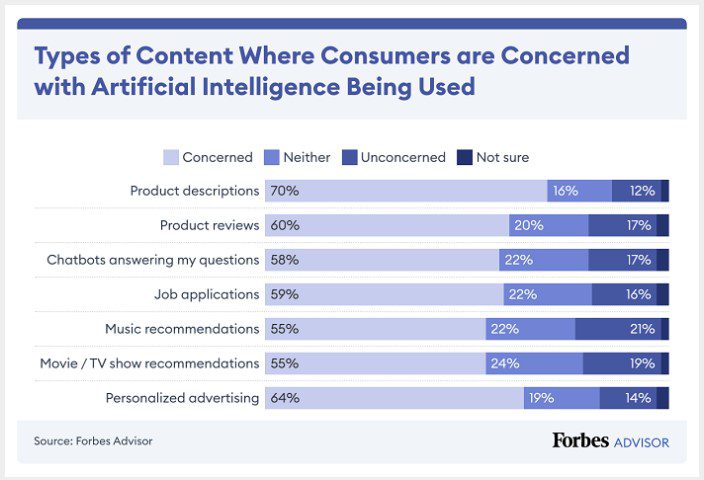TL;DR:
- Forbes Advisor conducted a survey of Americans to understand their concerns and attitudes toward AI tools like ChatGPT.
- Over 75% of respondents were concerned about misinformation from AI tools.
- Despite concerns, 65% planned to use ChatGPT instead of traditional search engines for information.
- Trust in businesses using AI tools varied widely among respondents, with just under half expressing some level of trust.
- Respondents were comfortable using AI for personalization and recommendations but less comfortable with its use in credit scoring and hiring decisions.
- The report highlights the need for transparency and accountability from companies using AI tools and for ethical and responsible AI practices to build consumer trust.
Main AI News:
The growing use of artificial intelligence (AI) tools such as ChatGPT has raised concerns about privacy and the overall impact of these new technologies. To better understand how consumers feel about AI, Forbes Advisor recently conducted a survey of Americans to determine their concerns, usage plans, trust in businesses using AI tools, and the types of personal data they are comfortable using with AI.
According to a new Forbes Advisor report, the survey found that over 75% of consumers expressed concern about the potential for misinformation from AI tools. Despite this concern, 65% of those surveyed indicated that they plan to use ChatGPT instead of traditional search engines when seeking information or answers.
This finding suggests that while consumers are wary of the potential for misinformation, they still see the value in AI tools like ChatGPT when it comes to accessing information quickly and efficiently. However, it also highlights the need for greater transparency and accountability from companies that develop and use AI tools.
The report also found that trust in businesses using AI tools varied widely among respondents, with just under half expressing some level of trust. In terms of personal data, the majority of respondents were comfortable with using AI for tasks like personalization and recommendations but were less comfortable with the use of AI for tasks like credit scoring and hiring decisions.
Overall, the Forbes Advisor report underscores the need for companies to be transparent about their use of AI tools and to address concerns around privacy and misinformation. As AI continues to become more ubiquitous, it will be increasingly important for businesses to build trust with consumers by ensuring that their use of AI is ethical, responsible, and aligned with consumer expectations.

Conlcusion:
The Forbes Advisor report on consumer attitudes toward AI tools highlights both the potential and pitfalls of this rapidly evolving technology. While the majority of respondents indicated a willingness to use AI tools like ChatGPT for information-seeking, concerns around misinformation and the use of personal data suggest that businesses will need to be transparent and ethical in their use of AI to build trust with consumers.
This report underscores the need for businesses to consider the ethical implications of their use of AI and to prioritize transparency and accountability in their AI practices. As AI continues to play an increasingly important role in businesses’ operations and consumer interactions, companies that can build trust around their use of AI are likely to have a competitive advantage in the market.

